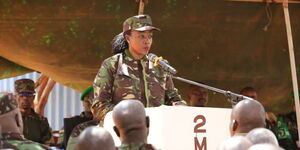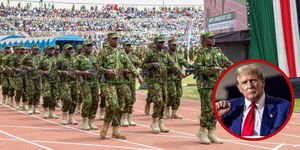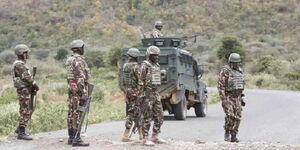In the 1950s, British colonialists were getting increasingly concerned with the bravery and intensity of the Mau Mau attacks on their station in the country. Kenyans at that time were also beginning to become politically conscious and reaching out to other countries for help and support in their quest for freedom.
It is recorded that in 1952, relations between Kenyans and the white minority remained strained. For most white settlers, Kenyatta was described as 'the principal enemy, an agitator with links to the Soviet Union who dared to marry a white woman.'
In early 1952, when the British were grappling with the MauMau and the state of emergency, they wrote to England asking to be supplied with information about Jomo Kenyatta's activities with communists.
After investigations and inquiries in the UK, a report was compiled and sent back to the country.
“I beg to report that information concerning certain activities of the above named (Jomo Kenyatta) and his associates have been supplied to the police here by a West African named George Williams of 297 Edge Lane Liverpool who has hitherto proved a most reliable witness,' the report began.
The bad blood between Kenyatta and the witness George William began when William, looking to purchase a club called Colonial Seaman's Welfare club, approached Ras Makonnen, then a rich gentleman and a good friend of Jomo Kenyatta for a £600 (Ksh75,000 today) loan.
A labor officer called R.B. Paul suggested to him that he forms a committee of 3 influential West African Indians; Leavy Constantine, Samuel Bennet and Samuel Uriah, who were at the time employed by the ministry of labor in Britain.
Realizing that he was short of funds, he approached Ras Makonnen, who was accompanied by Kenyatta, and alongside the 3 Indians he had selected, they deliberated the terms of the loan.
'Makonnen agreed to lend Williams the money provided it was repaid with £40 interest at the end of three months, but he stipulated that for that period Kenyatta should manage the club and if the £600 were not paid within three months Kenyatta should become Williams partner with equal control of the club management,' Kelvin Odhiambo, a journalist at Anglia Ruskin university wrote.
William did not take kindly to this arrangement, interpreting it as Makkonen's plan to take over his business. Two of the three Indians in his committee swore to resign if William did not take the deal.
After intense deliberation, they agreed on an interest rate of 30 pounds paid within 3 months after which they would sever their relationship.
The report finally concluded: "it is of course Known that Thomas Rwaki Ras Makonnen is virulently anti-British and inquiries in the past have shown that Whilst Constantine (Kenyatta's Code name) was resident in this area. There were reasons for strongly suspecting him of having extreme left-wing sympathies though he has never been known to be a communist party member.”
Having laid to rest the rumors that Kenyatta was being sponsored by communists to destabilize the colonial rule, they fabricated accusations about him being the head of the Mau Mau and put him in prison alongside the Kapenguria six in October 1952.












